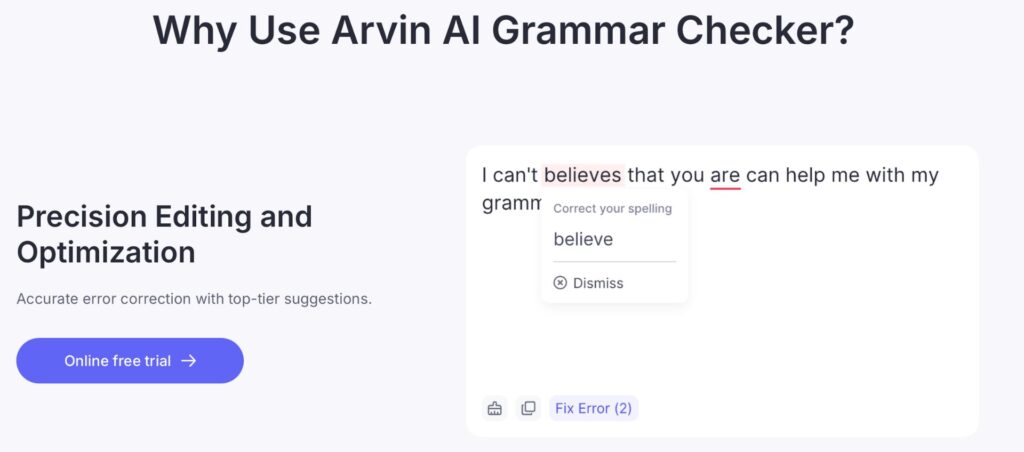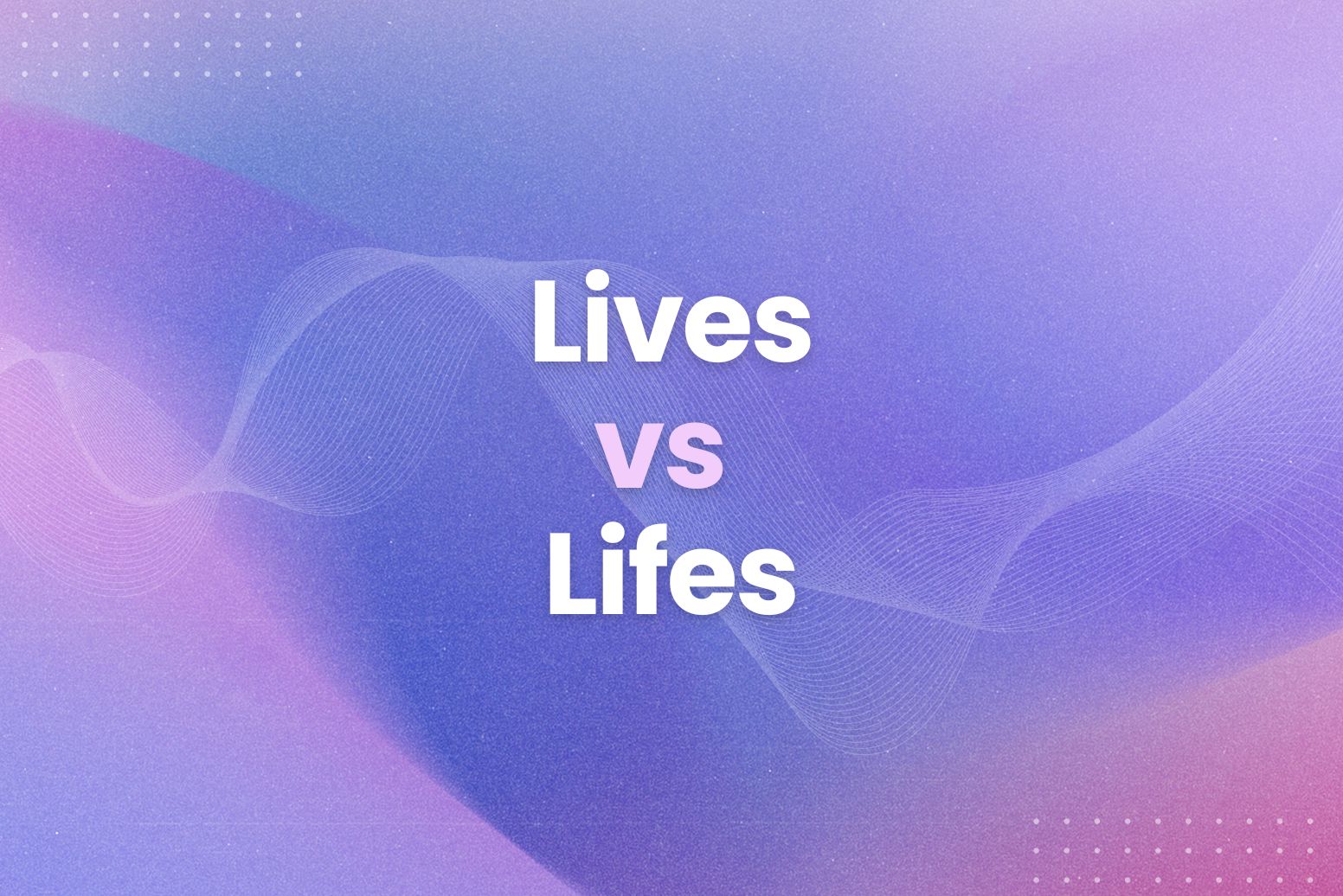If you’re wondering about the difference between a lawyer vs attorney, think of it like how all squares are rectangles, but not all rectangles are squares. Both terms deal with law, but there’s a subtle technicality.
For example, in Legally Blonde, Elle Woods is a lawyer as soon as she graduates from law school. However, she doesn’t become an attorney until she passes the bar exam and can officially represent clients in court.
Lawyers and attorneys know that even small errors can hurt your credibility. Let Arvin AI catch every mistake so you can focus on your expertise.
What Does Lawyer Mean?
A lawyer is someone who has studied the law and holds a degree in it, usually from an accredited law school, but might not yet have the credentials to argue a case in court.
They have the knowledge to understand legal systems, analyze cases, and give legal advice, but being a lawyer doesn’t automatically mean they can represent clients in court. That often requires passing the bar exam, depending on the country or state.
What Does Attorney Mean?
An attorney is a person who is legally empowered to represent others in legal matters.
Unlike a lawyer, who may simply hold a law degree, an attorney has passed the bar exam and is licensed to practice law, meaning they can handle court cases, draft legal documents, and provide formal legal advice.
Key Differences Between Lawyer vs Attorney
| Aspect | Lawyer | Attorney |
| Definition | Someone with a law degree. | Someone with a law degree. |
| Education | Graduated from law school. | Graduated law school and passed the bar. |
| Licensing | May not be licensed to practice. | Licensed to practice law. |
| Court Representation | Cannot represent clients in court unless licensed. | Can represent clients in court. |
| Primary Role | Knows the law but may not practice. | Actively practices law and works with clients. |
| Global Usage | A general term for anyone with a law degree, often interchangeable with “attorney.” | Specifically refers to licensed practitioners in the U.S. and other jurisdictions. |
| Pop Culture Examples | Elle Woods in Legally Blonde when she’s fresh out of Harvard Law. | Elle Woods after she passes the bar and practices in court. |
| Professional Scope | Can work in roles like consulting, legal research, or academia. | Focused on practicing law and advocating for clients. |
| Formality | Broader and less specific. | A more formal and specific term implying legal authorization. |
Common Misconceptions About Lawyer vs Attorney
Misconception 1: Lawyer and Attorney Mean the Same Thing
Not exactly. All attorneys are lawyers, but not all lawyers are attorneys.
Misconception 2: All Lawyers Can Represent You in Court
Nope! A lawyer might know the law inside and out, but unless they’ve passed the bar, they can’t stand up in court for you.
Misconception 3: The Terms Mean the Same Thing Everywhere
This is where things get a bit tricky. In the U.S., the words are used almost interchangeably in casual conversation. But in places like the U.K., they’re way more specific—solicitor and barrister are terms that describe different legal roles entirely.
Misconception 4: Lawyers Who Don’t Go to Court Aren’t “Real” Lawyers
Wrong! Lawyers can do all kinds of important work outside the courtroom. Some teach law, some work as corporate consultants, and others write policies. Remember Jessica Pearson from Suits? She’s a total legal genius running the firm, even though she doesn’t argue every case in court.
Attention to detail is critical in the legal field. Let Arvin AI help you write with precision and authority.
Lawyer vs. Attorney in the U.S.
In the U.S., lawyer and attorney are often used as if they’re the same thing, but there’s a subtle difference that’s important to understand. Both terms refer to someone who has studied the law, but their roles can vary depending on qualifications and licensing.
A lawyer is someone who has a law degree, meaning they’ve graduated from law school and know how to navigate legal systems. However, not all lawyers are licensed to practice in court. For instance, a lawyer might work in academia, research, or as a legal consultant, offering advice without directly representing clients.
An attorney, on the other hand, takes things a step further. They’re lawyers who have passed the bar exam in a specific state and are officially licensed to practice law. This means they can represent clients in court, draft legal documents, and argue cases before a judge.
In short, the U.S. legal system uses these terms interchangeably in casual settings, but if you’re looking for someone to represent you in court, make sure they’re an attorney.
Lawyer vs Attorney in the U.K. and Globally
In the U.K., the term lawyer is the general umbrella term. It’s kind of like calling someone a “chef” regardless of whether they’re making sandwiches or Michelin-star dishes. But within the world of lawyers, there are more specific roles.
For example, solicitors are the ones you go to for advice, preparing legal documents, and handling transactions, but they don’t typically represent clients in court. Barristers, on the other hand, are the courtroom warriors—these are the lawyers who actually argue cases in front of a judge. So, you could say, solicitors are like your behind-the-scenes strategists, and barristers are the ones taking the spotlight.
Globally, the legal system varies, so the role of a lawyer changes depending on the country. In some places, the term attorney might be used more widely, but the general rule is that if you’re in a courtroom in the U.K., you’re probably going to encounter a barrister. Outside of the U.S., it’s less likely that “attorney” will be the default term.
When Should You Use Lawyer?
The term lawyer works best when you’re referring to someone who knows the law but might not be licensed to practice in court.
It’s a broad term that covers anyone with a law degree, whether they’re arguing a case, teaching law, or reviewing contracts for a corporate team. If you’re not diving into the details of someone’s role, “lawyer” is the go-to.
When Should You Use Attorney?
You should also use attorney when you’re talking about legal representation. “My attorney is handling the settlement for me,” makes it clear that the person isn’t just giving advice—they’re actively managing the case.
This means they’ve passed the bar exam and are officially allowed to represent clients in court or sign off on legal documents. It’s a title that implies authority and action in the legal world.
Lawyers and Attorneys in Pop Culture
1. Elle Woods (Legally Blonde):
Elle begins as a lawyer when she graduates from Harvard Law, but she becomes an attorney after passing the bar and winning her first case.
2. Harvey Specter (Suits):
Harvey is the quintessential attorney—licensed, suave, and always ready to argue his way to a win in high-stakes cases.
3. Annalise Keating (How to Get Away with Murder):
A powerful attorney who dominates the courtroom while teaching law students how to handle cases with brilliance and grit.
4. Jessica Pearson (Suits):
A lawyer who focuses on managing her firm and making big decisions rather than directly representing clients in court.
5. Saul Goodman/Jimmy McGill (Better Call Saul):
Saul begins as a lawyer with questionable methods but evolves into an attorney, taking on cases (both legitimate and shady) with his signature flair.
6. Matt Murdock/Daredevil (Daredevil):
By day, Matt is a lawyer helping clients in Hell’s Kitchen. By night, he takes justice into his own hands as a vigilante.
7. Rudy Baylor (The Rainmaker):
A young attorney fresh out of law school who takes on a massive insurance company in a David-and-Goliath-style legal battle.
8. Daniel Kaffee (A Few Good Men):
As a lawyer and attorney, Kaffee navigates the pressures of the courtroom, culminating in his iconic “You can’t handle the truth!” moment.
9. Vinny Gambini (My Cousin Vinny):
A recently licensed attorney who uses his wit and unconventional style to defend his cousin in a murder trial.
10. Jackie Chiles (Seinfeld):
A lawyer who takes on ridiculous cases with over-the-top confidence, often parodying legal dramas.
11. Joe Miller (Philadelphia):
An attorney who fights a groundbreaking discrimination case, showcasing the emotional weight of courtroom battles.
12. Harvey Birdman (Harvey Birdman: Attorney at Law):
A satirical attorney representing cartoon characters in absurd legal disputes.
13. Kevin Lomax (The Devil’s Advocate):
An ambitious attorney who discovers the moral costs of chasing power in the legal world.
14. Atticus Finch (To Kill a Mockingbird):
The gold standard of attorneys, representing integrity and justice as he defends a wrongfully accused man.
15. Alan Shore (Boston Legal):
A witty attorney known for his unorthodox methods and impassioned courtroom speeches.
Lawyer vs Attorney vs Esquire
| Term | Definition | Example in Pop Culture |
| Lawyer | Someone who has studied law and holds a degree. | Elle Woods in Legally Blonde before passing the bar. |
| Attorney | A lawyer licensed to practice law after passing the bar. | Harvey Specter from Suits, representing clients in court. |
| Esquire (Esq.) | A formal title used by licensed attorneys in the U.S. | Often seen in correspondence, like “Jessica Pearson, Esq.” |
TLDR;
- Use lawyer when talking broadly about anyone trained in law.
- Use attorney when referring to someone who’s actively licensed to practice.
- Think of esquire as a badge of honor—a title reserved for attorneys in formal contexts.
Key Differences between an Attorney vs Barrister
What is an Attorney?
An attorney is a legal professional in the U.S. who is licensed to practice law after passing the bar exam. They handle a wide range of legal tasks, including representing clients in court, drafting contracts, and offering legal advice. Attorneys in the U.S. are generalists, meaning they often perform both advisory (behind-the-scenes) and advocacy (in court) roles.
What is a Barrister?
A barrister, on the other hand, is a type of lawyer in the U.K. and other common law countries like Australia. Barristers specialize in courtroom advocacy and litigation. They’re the ones who argue cases in front of a judge and jury, often wearing traditional wigs and gowns. Unlike attorneys, barristers are usually hired by solicitors, who do the behind-the-scenes work, to present cases in court.
| Aspect | Attorney | Barrister |
| Location | U.S. and other countries with similar systems. | U.K., Australia, and other common law jurisdictions. |
| Primary Role | Generalist—handles legal advice, negotiations, and courtroom representation. | Specialist—focuses on courtroom advocacy and arguing cases. |
| Client Interaction | Works directly with clients. | Typically works through solicitors who prepare the case. |
| Appearance | Formal suits in the courtroom. | Traditional wigs and robes in court. |
| Pop Culture Example | Annalise Keating in How to Get Away with Murder. | Rumpole in Rumpole of the Bailey. |
How Do You Become an Attorney?
Here’s a step-by-step guide to becoming an attorney:
1. Earn a Bachelor’s Degree
- Complete a four-year undergraduate program.
- Popular majors include political science, history, or criminal justice, but any major works (even fashion, like Elle Woods from Legally Blonde).
2. Take the LSAT (Law School Admission Test)
- The LSAT measures your analytical and reasoning skills.
- A high score increases your chances of getting into top law schools.
3. Apply to and Complete Law School
- Attend an accredited law school, which typically takes three years.
- Earn a Juris Doctor (J.D.) degree while studying subjects like contracts, criminal law, and legal ethics.
4. Pass the Bar Exam
- Take the bar exam in the state or jurisdiction where you plan to practice.
- It’s a challenging test with essays, multiple-choice questions, and legal performance tasks.
5. Meet Character and Fitness Requirements
- Undergo a background check to ensure you meet ethical and moral standards.
- This step verifies your suitability for the legal profession.
6. Get Sworn In
- Take an official oath to uphold the law and professional ethics.
- Once sworn in, you’re legally recognized as an attorney.
7. Maintain Your License
- Complete continuing legal education (CLE) courses to stay updated on legal changes.
- Renewal requirements vary by state, but staying informed is part of the job.
Whether you’re a law student drafting essays or a practicing attorney preparing documents, Arvin AI’s free Grammar Checker ensures your writing is polished and professional.
Lawyer vs Attorney Salary
Attorney:
The national average salary for an attorney is $153,879 per year. Attorneys often earn more because they’re licensed to represent clients in court and take on high-stakes cases.
Lawyer:
Lawyers, who may not always be licensed to practice in court, earn an average of $96,557 per year. Their roles often include research, consulting, or working in academia, which can affect their overall earnings.
Can All Lawyers Be Called Attorneys?
No, not all lawyers can be called attorneys. While every attorney is technically a lawyer, not all lawyers qualify as attorneys. The distinction lies in licensing and practice.
Examples of Famous Lawyers vs Attorneys
Barack Obama (Lawyer)
Before stepping into the Oval Office, Obama made his mark as a law professor and community organizer. He earned his degree from Harvard Law and focused on academic and social reform work. While his career didn’t involve arguing in courtrooms, he focused on community work and teaching, which made him a lawyer but not an active attorney.
Amal Clooney (Attorney)
Few names carry as much weight in international law as Amal Clooney. She’s not just a lawyer but a practicing attorney, taking on cases that fight for human rights. She’s fought for international justice, defending journalists and victims of war crimes, and her cases make headlines for all the right reasons.
Ruth Bader Ginsburg (Attorney)
Before her Supreme Court legacy, Ginsburg was a trailblazing attorney who argued cases that transformed the legal landscape for gender equality. RBG didn’t just change the game; she rewrote the rules.
Before becoming a Supreme Court Justice, she worked tirelessly as an attorney, arguing landmark cases that redefined gender equality. Her early career was less about the robes and more about the fight, proving that even the highest legal minds start in the trenches. Her work before the Supreme Court laid the foundation for decades of legal reform, making her one of the most celebrated legal figures in history.
Michelle Obama (Lawyer)
Michelle’s legal career was just the beginning of her incredible journey. After graduating from Harvard Law, she worked as a corporate lawyer before transitioning to public service and nonprofit work. While she didn’t continue practicing law, her time as a lawyer shaped her ability to navigate leadership roles.
Gloria Allred (Attorney)
With her fiery courtroom presence, Gloria Allred has become the face of justice for victims of harassment and discrimination. She’s an attorney who actively fights for change, from tackling gender inequality to representing high-profile cases like those against Bill Cosby.
Nelson Mandela (Lawyer)
Mandela’s early days as a lawyer were just the start of his lifelong pursuit of justice. Co-founding the first Black law firm in South Africa, he used his legal expertise to challenge apartheid laws. His legal work was less about contracts and more about resistance, and his activism took him out of the courtroom, but his foundation as a lawyer informed his fight for equality.
Alan Dershowitz (Attorney)
Known for his high-profile defenses and controversial cases, Dershowitz is a courtroom legend. From working on O.J. Simpson’s trial to being a legal scholar and author, his career as an attorney combines advocacy and education.
Kamala Harris (Attorney)
Kamala’s journey as California’s Attorney General solidified her role as a practicing attorney. Before becoming Vice President, Kamala Harris served as California’s Attorney General, representing the state in legal matters and overseeing complex prosecutions.
Abraham Lincoln (Lawyer and Attorney)
Before becoming one of America’s greatest presidents, Lincoln was a hands-on attorney. He balanced roles as both a lawyer and an attorney, taking on everything from local disputes to complex murder trials. His reputation as “Honest Abe” started in the courtroom.
Robert Kardashian (Attorney)
Known for his role in O.J. Simpson’s “Dream Team,” Kardashian took the spotlight during one of the most infamous trials in history. He was an attorney during one of the most infamous trials in history, and while he left the legal field afterward, his role in the case cemented his place in pop culture.
Even the most well-written contracts or motions need a second look. Use Arvin AI to perfect every detail.
Lawyer vs Attorney in Everyday Conversations
Here’s how the terms lawyer and attorney can be used in everyday situations:
- “I hired an attorney to represent me in court for my custody battle.”
- “The attorney argued her case brilliantly and won over the jury.”
- “You need an attorney who specializes in intellectual property law to handle this patent issue.”
- “My sister has a law degree and is working as a legal consultant, so she’s a lawyer but not an attorney.”
- “If you want someone to represent you in court, make sure they’re an attorney, not just a lawyer.”
- “He became an attorney after passing the bar, but before that, he was just a lawyer helping with legal research.”
Whether you’re a seasoned attorney or a law student, Arvin AI keeps your grammar on point.
Final Words
As you refine your understanding of. a lawyer vs attorney, don’t forget that the way you communicate matters just as much as the message itself. Legal professionals, in particular, know the weight of every word.

That’s where tools like Arvin AI’s Grammar Checker come in. It’s not just about fixing typos—it’s about ensuring your writing reflects the precision and professionalism that the legal field demands.
FAQs About Lawyer vs Attorney
Not exactly. An attorney is always a lawyer, but a lawyer isn’t always an attorney.
In Singapore, legal professionals are typically called advocates and solicitors. The country’s legal system combines elements of both British and common law traditions, so the term “lawyer” is also commonly used.
Canadians predominantly use the term lawyer. The word “attorney” is less common unless referring to an “attorney general” or similar official position.
The main difference is that a lawyer is someone who has a law degree, while an attorney is a lawyer who has passed the bar exam and is licensed to represent clients in court.
Only if they are also an attorney. A lawyer who hasn’t passed the bar exam cannot legally argue cases in court.
Attorneys handle a range of legal tasks, including representing clients in court, drafting contracts, offering legal advice, and filing lawsuits.








